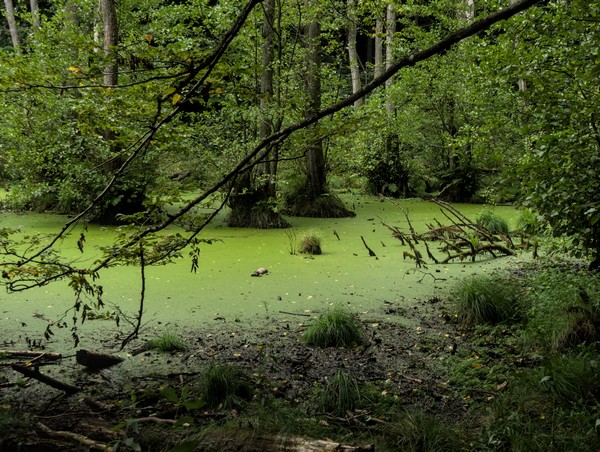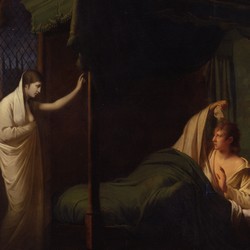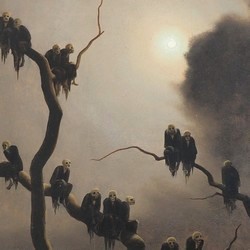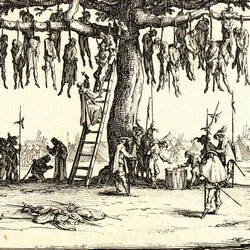
A kind reader asked me a few days ago if we wouldn't have a "Halloween-Lied". Well, I hadn't even think about it, but... why not? We can easily find stories of spirits, ghosts, and creatures from the otherworld in the repertoire. So today we have a horror story.
Elves are not part of my culture, so I hardly know them. I know, for example, the elves created (or recreated) by J.R.R. Tolkien or those working for Santa Claus. Well, as a Lied lover, I know the Elf-King and some other members of his family.
North European cultures, however, live together with elves since thousands of years ago. Their shape and habits have changed over the centuries, but more or less we could describe them as creatures that live in the woods and look similar to humans, but in an improved version: higher, slender, paler and more beautiful. That is, they look much more like Tolkien's elves than like Santa Claus'. Regarding their relationship with humans, they're usually indifferent to us (why should we be considered, we little, insignificant people?); sometimes we are the victims of their mischiefs, and sometimes they treat us as a careless and capricious child would treat a pet. That is, we serve to entertain them, and little else. Elves spend their time playing, dancing and singing; As they often get bored, they are a nuisance for other elves or for human beings (for a time, “fairy” and “elf” were synonymous, think of the fairies from A Midsummer Night's Dream). Of course, they also have a dark side, and in the Middle Ages, they were supposed to be related to illness: wretch people who run into them used to suffer strange mental disorders or sudden deaths.
They're many ballades and legends about elves, as our story this week. It's originated most likely in Denmark, and was collected by Thomas Percy in Reliques of Ancient English Poetry, published in 1765. Herder published a German version, Erlkönigs Tochter, in Von deutscher Art und Kunst in 1773, and Carl Loewe composed a great song, Herr Oluf, in 1821. The ballad shows us the darkest side of elves: Herr Oluf returns home after inviting friends and relatives to his wedding, which will be the next day, and has the misfortune to meet the daughter of the Elf-King, who wants him to dance with her. But Herr Oluf don't think dancing with a lady the day before he gets marry is right, and refuses. If you're familiar with other songs with elves, you suspect how the story ends, so I'll let Loewe tells it. I'll just suggest you pay attention to the fine way the composer draws the different characters and the three scenes from the ballad; we will listen to Herr Oluf performed by the excellent Konstantin Krimmel and Doriana Tchakarova.
I have never fully understood why the Elf-King turns into Erlkönig in German; literally, Alder-King. I once read that it probably was a mistranslation of Herder; Goethe, who wrote his Erlkönig inspired by this ballad, Erlkönigs Tochter, would have dragged the mistake. But elves, elfen, are part of German tradition, and both Herder and Goethe should know it. Was this name, Alder-King, found in the English text? The truth is that I wasn't able to find the English version of Erlkönigs Tochter in the Reliques. Or maybe elves have anything to do with alders, considered in some traditions to be magical, sacred trees? The picture in this article shows marsh alders. They are in a forest where there is hardly any light at the middle of the day. I don't know how it should be like to spend the night in that forest... Maybe Halloween Night?
Herr Oluf reitet spät und weit,
Zu bieten auf seine Hochzeitleut.
Da tanzten die Elfen auf grünem Strand,
Erlkönigs Tochter reicht ihm die Hand:
„Willkommen, Herr Oluf, komm tanze mit mir,
Zwei göldene Sporen schenke ich dir.“
„Ich darf nicht tanzen, nicht tanzen ich mag,
Denn morgen ist mein Hochzeittag.“
„Tritt näher, Herr Oluf, komm tanze mit mir,
Ein Hemd von Seiden schenke ich dir,
Ein Hemd von Seiden so weiss und fein,
Meine Mutter bleicht’s mit Mondenschein.“
„Ich darf nicht tanzen, nicht tanzen ich mag,
Denn morgen ist mein Hochzeittag.“
„Tritt näher, Herr Oluf, komm tanze mit mir,
Einen Haufen Goldes schenke ich dir.“
„Einen Haufen Goldes nähme ich wohl,
Doch tanzen ich nicht darf noch soll.“
„Und willst du, Herr Oluf, nicht tanzen mit mir,
Soll Seuch’ und Krankheit folgen dir.“
Sie tät ihm geben einen Schlag aufs Herz,
Sein Lebtag fühlt er nicht solchen Schmerz.
Drauf tät sie ihn heben auf sein Pferd:
„Reit hin zu deinem Fräulein wert!“
Und als er kam vor Hauses Tür,
Seine Mutter zitternd stand dafür.
„Sag an, mein Sohn, und sag mir gleich,
Wovon du bist so blass und bleich?“
„Und sollt ich nicht sein blass und bleich?
Ich kam in Erlenkönigs Reich.“
„Sag an, mein Sohn, so lieb und traut,
Was soll ich sagen deiner Braut?“
„Sagt ihr, ich ritt in den Wald zur Stund,
Zu proben allda mein Ross und Hund.’
Früh Morgens, als der Tag kaum war,
Da kam die Braut mit der Hochzeitschar.
Sie schenkten Met, sie schenkten Wein:
„Wo ist Herr Oluf, der Bräutgam mein?“
„Herr Oluf ritt in den Wald zur Stund,
Zu proben allda sein Ross und Hund.“
Die Braut hob auf den Scharlach rot,
Da lag Herr Oluf und war tot.
Lord Oluf rides late and far
to summon his wedding guests.
Elves are dancing on a green bank,
and the Erlking's daughter offers him her hand.
"Welcome, Lord Oluf, come dance with me
and I will give you two golden spurs."
"I cannot dance, I do not wish to dance -
for tomorrow is my wedding-day."
"Come closer, Lord Oluf, come dance with me,
and I will give you a shirt of silk,
a shirt of silk so white and fine -
my mother bleached it with moonbeams!"
"I may not dance, I do not wish to dance -
for tomorrow is my wedding-day."
"Come closer, Lord Oluf, come dance with me
and I will give you a heap of gold."
"A heap of gold I would gladly take,
but I cannot and should not dance with you."
"If you will not dance with me, Lord Oluf,
then plague and sickness will follow you!"
She dealt him a blow to the heart,
and all his life he had never felt such pain.
Then she heaved him up upon his horse:
"Ride home to your worthy lady then!"
And when he came to the door to his house,
his mother, trembling, stood before him.
"Tell me, my son, and tell me true,
Why are you so pale and sick?"
"And should I not be pale and sick?
I was in the Erlking's realm."
"Tell me, my son, so dear,
What should I tell your bride?"
"Tell her that I rode to the wood just now,
To test my horse and hound."
At early morning when day had hardly dawned,
his bride arrived with the wedding crowd.
They poured mead and wine:
"Where is Lord Oluf, my bridegroom?"
"Lord Oluf rode to the wood just now,
To test his horse and hound."
The bride lifted up the cloth scarlet red,
And there lay Lord Oluf: he was dead.
(translation by Emily Ezust)

















Comments powered by CComment